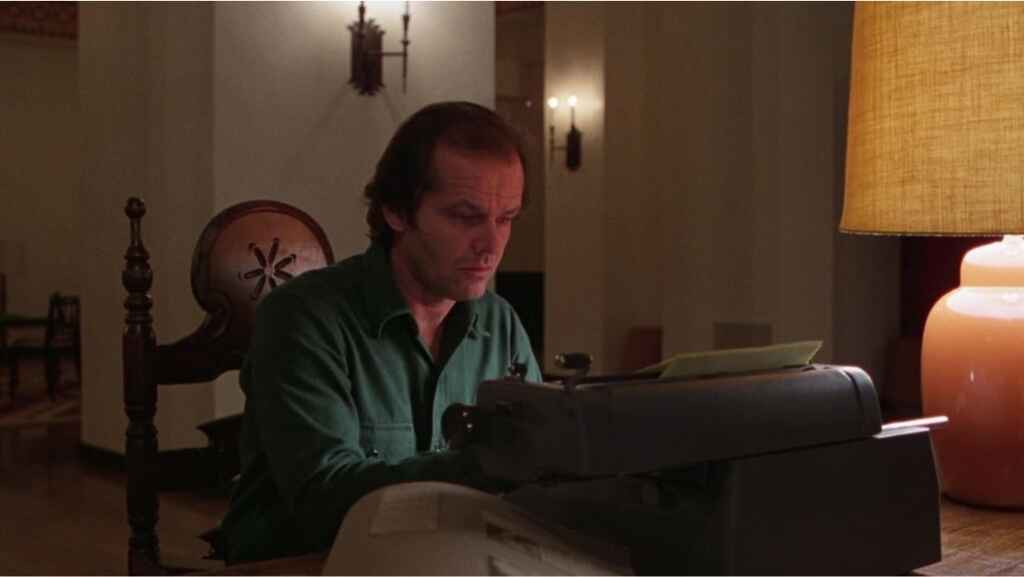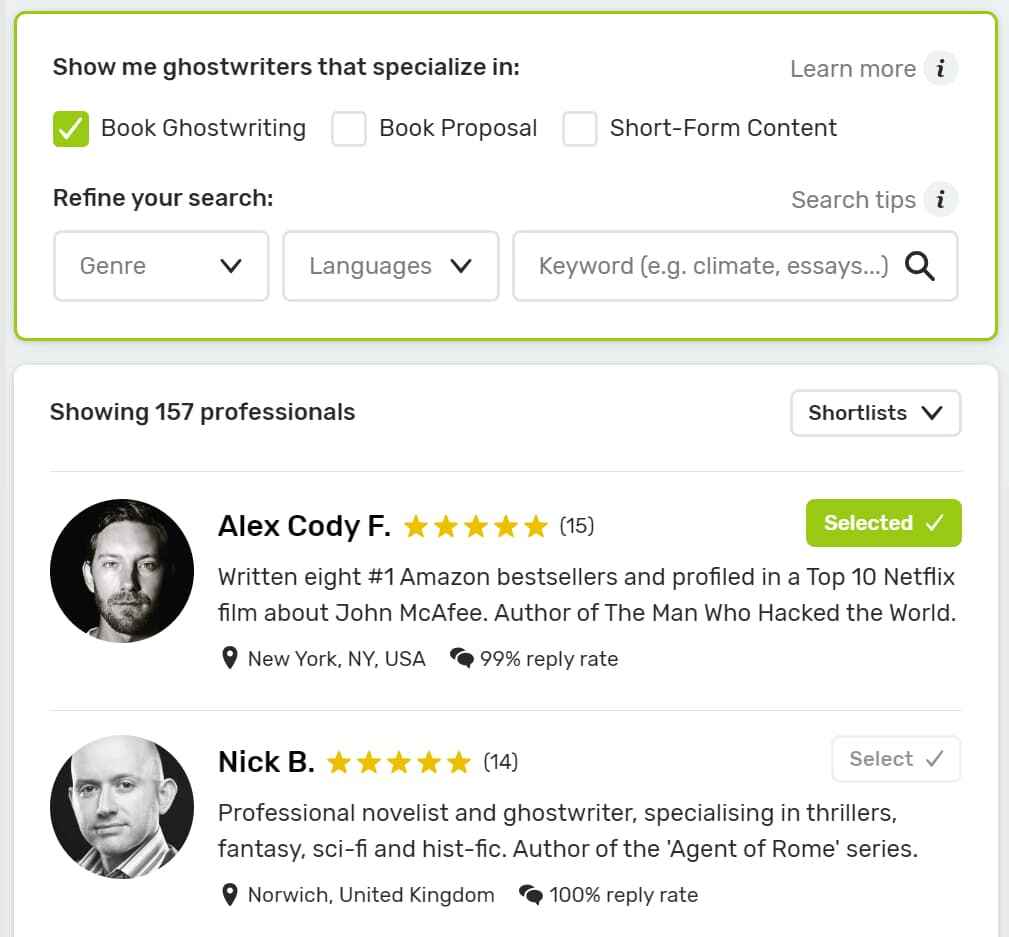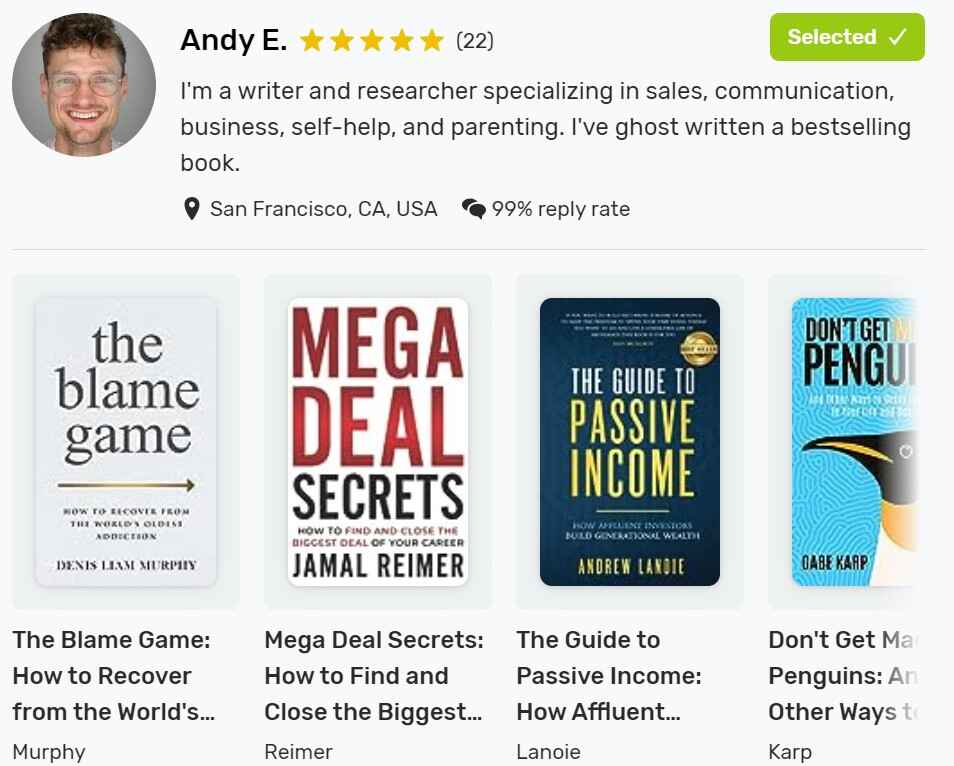Last updated on Oct 14, 2025
What is a Ghostwriter? (And How Can You Hire a Great One?)
Dario Villirilli
Editor-in-Chief of the Reedsy blog, Dario is a graduate of Mälardalen University. As a freelance writer, he has written for many esteemed outlets aimed at writers. A traveler at heart, he can be found roaming the world and working from his laptop.
View profile →There are a small handful of ghostwriters whose books have sold more copies than almost any author alive — but you won’t ever hear their names. They are the hidden titans of the publishing world: mercenary heroes who are called in at a moment’s notice to turn someone else’s idea into a hit book.
In this post, we'll dust off our Ouija board to learn more about professional ghostwriters — what they do, how they can help you, and where you can find the right ones for your project.
What is a ghostwriter?
A ghostwriter is a professional hired to write something credited to someone else. From celebrity memoirs and speeches to query letters and blog posts, a ghostwriter can either complete an entire project solo or work collaboratively with the text's credited author to help them get published. And, much like ghosts, these writers will avoid being discovered.
They work on projects credited to other people
Ghostwriters are not to be confused with authors who choose to publish their work anonymously, authors who use nom de plumes, or co-writer teams where both authors are credited. As the name implies, ghostwriters work away from the spotlight to bring other people's ideas to life.
If you've been struggling to write a book, a blog post, or anything else involving words, your solution might be to hire a ghostwriter — someone who has the writing chops to turn your book idea into reality but who prefers to work in the shadows.
Struggling to come up with winning book ideas? Check out this article for inspiration.
Typically, readers don't know a ghostwriter's involvement in a writing project. This may sound suspicious, but it's actually a pretty transparent business once you bust the myth:
- Party A brings the ideas and the knowledge; and
- Party B transforms it all on the page without taking credit for the final product.
Curious about a ghostwriting career?💡Check out our guide to becoming a ghostwriter, complete with insights from professionals.
There’s nothing shady about ghostwriters
It might seem strange that ghostwriters don’t take any credit for their work, and you might worry that they’ll resent you, but rest assured: contracted ghostwriters are perfectly happy with their jobs. Ghostwriting collaborations are as rewarding for the ghostwriter as they are for the person hiring them, and they've helped countless people fulfill publishing goals they could previously only dream of.

Ghostwriters complete clients' assignments and are compensated fairly for their work — just like any other freelance writer. The fact that they don't receive public credit does not mean they are financially exploited.
In fact, they often make more money than other types of freelancers, and they get to work with all sorts of exciting clients, learning a lot of new things along the way. Many ghostwriters also publish under their own names, so ghostwriting doesn't deprive them of a credited writing career.
Q: What are alternative ways to provide credit for a ghostwriter?
Suggested answer
Over the past 22 years, I’ve ghostwritten more than 40 books, and have received co-authorship credit for only one. In that case, I received a “with” credit. In other words, the book cover says “By [client name]” “with [my name].” In every other book, I’m named in the acknowledgements section as an “editor” or a “collaborator.” In a few cases, I'm not mentioned anywhere. I didn’t become a ghostwriter to see my name in print, so I don’t mind that most authors don’t want my name on the cover. But it’s nice when they do. Among ghostwriters and some authors, even a “with” credit clearly indicates that the person whose name follows is the one who wrote the book. If you’re an author, keep this last point in mind. If you don’t want anyone to know that you worked with a ghostwriter, then tuck the writer’s name somewhere inside the book and refer to them as an "editor."
Peter is available to hire on Reedsy ⏺
Other than an on-cover credit "with" or "and," most often credit is given in the acknowledgements. And often you have written your own acknowledgement for the client. On occasion, there is a foreword that explains the writing process and credit appears there.
Tom is available to hire on Reedsy ⏺
Most ghostwriters aren't worried about getting credit, but it is always nice to be on the cover. If that is not possible, maybe a mention in the acknowledgements. Sometimes clients even talk about their ghostwriters when they are promoting the books, which is lovely.
Andrew is available to hire on Reedsy ⏺
Absolutely! A few options:
- The client could mention your contributions in the Acknowledgments section.
- The client could name you as a collaborative or contributing writer, rather than a ghostwriter.
- The client might credit the book as "By [Client Name] with [Your Name].
To use a personal example, a few novels I ghostwrote have the author's name on the cover, but on the title page it says [Author Name] in big font below the title, and "with Michelle Schusterman" in smaller font below that.
Michelle is available to hire on Reedsy ⏺
What can ghostwriters do for you?
Hiring a ghostwriter is a perfectly reasonable choice if you have insights to share with the world but not the skills to translate them into words. As long as you're bringing the ingredients to the table, there's no harm in having someone else assemble them into an appetizing experience.
Hire an expert ghostwriter
David P.
Available to hire
Nearly 50 books in print. Retired university teacher. Latest: THE ACADEMY, St. Martin's; WRITING IN THE AGE OF AI, Northampton House Press.
Jane R.
Available to hire
I'm a children's book specialist with nearly 30 years' experience of writing and editing everything from Winnie-the-Pooh to Minecraft.
Doug W.
Available to hire
Simply put, I connect authors and audiences. Nothing's more important than the emotional connection that makes a story unforgettable.
They bring your story to life
Ghostwriters bring other people's stories to the page in both fiction and nonfiction. They are versatile, the chameleons of the writing world, and can effortlessly switch between styles and genres.
Ghostwriters are perhaps best known for writing memoirs and other autobiographical texts. No one knows your life story better than you, but you may lack the know-how to tie it all together in a way that is easy to follow and that the average reader will appreciate. Enter the ghostwriter, who can synthesize all your memories and anecdotes into a moving autobiography or entertaining memoir with a little distance from the topic!
The best-known iteration of this is the celebrity memoir, often commissioned by publishers who understand the appeal of a household name. For example, not-so-anonymous ghost J.R. Moehringer helped Phil Knight tell his story about how he founded Nike in Shoe Dog, and he's the pen behind Prince Harry’s memoir, Spare.

But a ghostwritten memoir isn't solely the reserve of celebs — anyone who's lived a full and interesting life can benefit from a nonfiction ghostwriter, especially if you've always wanted to write a memoir but have never had the time.
Check out David Wichman's account of how a ghostwriter helped him own his life story here.
Ghostwriters can help your business
Being seen as an expert in one's field is a significant asset, and perhaps the best way to achieve this is by putting out a relevant book. But running a successful business doesn't necessarily mean you can articulate how you've done it — that's where the ghostwriter comes in.
This type of nonfiction is often self-published and used as a point of authority for entrepreneurs. In addition to creating content for a book, the ghostwriter may also help shape the branding and tone of the client's other marketing materials (website, social media, etc.) to ensure consistency across all platforms.
💸
What will it cost you to hire a ghostwriter?
Or synthesize your ideas into a book proposal
Ghostwriters are also invaluable partners for putting together a book proposal to wow agents and publishers.
Proposal writing is an art form all of its own and can be tricky, especially if you're a debut author submitting for the first time. So if you're confident in your writing skills but not your proposal-penning, you can hire a ghostwriter with a history of working with publishers — someone who knows precisely what acquiring editors want to see.
Does this sound like you? If so, learn more about how a ghostwriter can help you nail your book proposal.
Ghostwriters can contribute to book series
To keep up with demand, publishers of popular series can hire multiple ghostwriters to churn out books under a single author's name. This is especially common with well-known children's series such as Nancy Drew, Animorphs, and The Baby-Sitters Club, probably because young readers devour them so fast!

Similarly, publishers also hire ghostwriters to continue an established author's legacy. For example, have you ever wondered how Robert Ludlum, author of the Jason Bourne series, has managed to write 32 books since he died in 2001? 🤔 Publishers frequently do this when a deceased author leaves piles of unpublished drafts and ideas.
You might not be at that level of publishing success yet, but if you just want to keep up a high rate of writing output while publishing a series, you, too, can consider bringing in reinforcements in the form of a ghostwriter. Any ghostwriter worth their salt will know how to meet you where you are in style and voice, ensuring that your work stays consistent over time.
If you want to find out more, check out our list of popular novels you never knew were ghostwritten!
Q: What are the most effective ways for prospective clients to assess whether a ghostwriter can capture their unique voice?
Suggested answer
Great question – I have to answer it in a roundabout way. I always say this to my authors: ‘Look, the relationship between ghost and author is really important. We’ve got to get it right. The only way to see if it’s going to work is to give a shot. I’ll sit with you, I’ll do a couple of interviews. If you feel things aren’t right, or if I feel things aren’t right, we’re both free to walk away at any time.’
That freedom creates trust, and that trust allows the author to talk freely about the things they’re most passionate about, the things that made them want to write a book in the first place. And from my point of view, listening to someone talk freely about the things that they’re most passionate about is always so compelling, so absorbing. The words they use, the idioms they use, the way they express themselves start to sink in, and when it comes time to write their story, what emerges is their story in their words. Get the relationship right and the voice will come.
It’s also important to point out that this is an iterative process. A first draft is just that – it’s designed to be pulled apart and redone, and redone again until we arrive at a text that the author can be proud of. Say: ‘Don’t censor yourself. Talk freely. You’ll have plenty of time to review what I write. Nothing will end up in the final draft that you’re not happy with.’
So you can’t really demonstrate that you can get their voice at the beginning of a project. You can offer referees of course – I always do, but really getting the voice right begins with trust and flows from that.
For the record, I’ve never had anyone walk away. A couple of interviews in and they’re starting to really enjoy the process. That’s another thing – authors love the process after a while. It’s such a rewarding thing to talk freely about things you’ve done, the things you feel most passionate about.
John is available to hire on Reedsy ⏺
Ooh, that is such a good question!
One of the hardest parts of choosing an editor is trusting that they’ll get you – your tone, your rhythm, your way of telling a story-that’s what “voice” is, after all, the thing that makes your writing yours.
So how do you know if an editor can capture it rather than flatten it?
A few practical ways can help.
First, ask for a sample edit. Even a page or two will tell you a lot. Do their suggested changes make your writing clearer and sharper without stripping away your personality? If you read it back and it still sounds like you – just a more polished version – that’s a good sign.
Secondly, pay attention to how they listen-and, for me, listening comes first as a ghostwriter. A good editor doesn’t just correct or 'get technical'; they ask questions about your intent, your audience, and the effect you want to create.
If they’re interested in what lies behind your words, they’re far more likely to respect your voice on the page.
Thirdly, read their testimonials or portfolio. Past clients will often mention whether an editor was sensitive to style and tone. If you see repeated praise for “keeping my voice intact,” that’s worth noting.
Finally, trust your instincts after a conversation. If you feel heard and understood in person, that relationship usually translates well into the editing process. This is your book and you will be telling your story from your heart-your writer needs to be able to understand and absolutely empathise with that fact.
In the end, the right editor won’t make your work sound like theirs. They’ll make sure it sounds like you – at your very best.
YOUR voice.
Edward is available to hire on Reedsy ⏺
Having failed the Vulcan mind-meld certification course, I know only one way to capture an author’s voice. Interviews. Lots of them. Here’s what I tell every prospect … As a ghostwriter, I will spend lots of time interviewing you. And thanks to these interviews, I’ll acquire much of the book's content, as well as your unique point of view, key messages, and ways of speaking. Every interview is recorded and transcribed, so when it comes time to write the manuscript, I can simply copy, paste, and edit/rewrite large portions of the transcripts. The book’s voice will match yours for the simple reason that much of the book is your actual voice, answering questions and telling stories. I’ll probably spend as much time (or more time) planning the interviews, crafting interview questions, and listening intently as I’ll spend writing the book. In short, I capture authors' voices by recording and using many of their own words. That’s my “trick.” Which really isn’t a trick.
Peter is available to hire on Reedsy ⏺
Since skilled ghostwriters adapt their writing to match their clients' voices, taking a look at multiple samples of their work to confirm that different assignments sound different is one way to see if a ghostwriter can capture your voice. If all of their samples sound the same, then they're writing in their own voice and not their clients'.
Marcia is available to hire on Reedsy ⏺
They can write short-form content for you, too
Besides turning your blog into a long-form book, ghostwriters can also help you pen the content for your blog or any other short-form content that you may be too busy to write yourself or want to make sure to get just right.
Blog writers
One growing source of work for ghostwriters is the blogosphere. Have you ever browsed a public figure's blog and wondered if they wrote all the content themselves? If they're prominent, there's a good chance they didn't. Instead, they'll have a few dedicated ghostwriters who write content on their behalf. These ghostwriters will research, plan, and churn out numerous posts on subjects that appeal to that figure's audience, a model used by many businesses to run corporate blogs.
This is probably the most common type of short-form ghostwriting because people don't always label it as such! Many bloggers and business owners outsource their posts to freelance writers but may think of it more as uncredited guest blogging than bona fide ghostwriting.
Speechwriters
Another arena where ghostwriters excel is in speech writing. Ghostwriters are a godsend for anyone lacking the time or skill to craft a memorable speech. Nowadays, it's a given that something like a presidential speech will be mostly another person's work. But you don't have to be the POTUS to turn to a ghost for your next public speaking opportunity: some people even hire them to ghostwrite their wedding speeches!
Now that you know exactly what a ghostwriter does and why you might want to hire one, the only step left is to track down these elusive spectral authors.
How to find a ghostwriter

If you need to hunt down a ghostwriter, there’s no better person to ask than a real-life ghostwriter. To help you find a suitable collaborator for your project, we’re turning to Reedsy’s Tom Bromley.
As a former publisher and a ghostwriter, Tom has worked with clients on dozens of different titles, both with traditional publishers and self-published works. Each project had different starting points in how that relationship came about. We’re going to draw on Tom's experience to give you his best advice on how to find and select potential ghosts for your book.
How to find a ghostwriter:
- 1. Browse marketplaces and agencies (read here)
- 2. Determine the experience you seek (read here)
- 3. Evaluate their previous work (read here)
- 4. Reach out to a few ghosts (read here)
- 5. Get a sample of their writing (read here)
1. Browse marketplaces and agencies
To track a good ghostwriter down in the undergrowth, you’ll need to become a bit of a literary David Attenborough! There are probably five places to start your hunt…
Where to find ghostwriters:
- Freelancer marketplaces
- Literary agents and publishers
- Ghostwriting agencies
- LinkedIn and job sites
- Google search
Freelancer marketplaces
Many ghostwriters work for themselves, so ghostwriter Tom Bromley suggests starting your search on a freelancer marketplace, such as the one at Reedsy. “The advantage of using such a site is that the list of ghostwriters available is curated or quality-checked.” With strict criteria regarding the freelancers on Reedsy’s platform, each one will have several years of experience and multiple projects under their belt.

There is also the advantage of working within a pre-established and monitored system with regard to payment and so forth: if there are any disputes, there is a set-up to mediate and resolve them fairly, which you wouldn’t have if you were dealing with the ghost directly.
Of course, Reedsy is not the only site that lists freelance gigs. Less experienced ghostwriters can be found on open marketplaces like Fiverr, Upwork, and Mediabistro. It’s worth noting that these less specialized freelancing marketplaces are not as stringent with their vetting and quality control, and you’ll need to bear this in mind when weighing up your options.
Q: What steps do publishing professionals take to ensure client confidentiality and discretion in an author's work?
Suggested answer
First of all, it is common that your agreement with the subject will include language concerning confidentiality. Second, your reputation should speak for itself.
Tom is available to hire on Reedsy ⏺
For me, confidentiality isn’t just a professional obligation, it’s a matter of personal integrity.
When someone entrusts me with their story, I see it as exactly that: a gift of trust.
The first step I take is always to make it clear that everything we discuss, whether written down or spoken, stays between us-that includes, surprising as this may seem, given someone is telling me their story that when they say something is 'off the record' (ie) is not to be included in the book, then not only do you acede to their request, you never make use of that information elsewhere-however 'juicy' it might be!
On a practical level, that means keeping files secure, not sharing material without permission, and, where appropriate, putting formal agreements in place.
But beyond the paperwork, it’s about how I conduct myself.
I listen without judgment, respect what’s private, and never forget that I’m being trusted with someone else’s voice, memories, and experiences.
Writers need to feel safe if they’re to be honest on the page. My role is to protect that space & with discretion, care, and the quiet understanding that what’s shared with me is theirs until they decide otherwise.
Edward is available to hire on Reedsy ⏺
Literary agents and publishers
The second place to look is via the two main elements of traditional publishing — literary agents and publishers. Most literary agents will have a ghost on their books, or at least a writer or two they might try to persuade you would be suitable for a job.
Under this arrangement, the agent will represent the ghost, which can be positive or negative, in Tom Bromley’s experience. “Not only will you have to factor in their fee, but they’ll have their client’s interest at heart. The potential upside is that they may offer to represent your book idea themselves if they like your book idea.”
Traditional presses can be another source of ghostwriters. "Most publishers have particular ghosts that they use regularly. If you can speak to a publisher, they may be kind enough to offer a suggestion. And if you're very lucky, a publisher might even decide to take the book on themselves."
Ghostwriting agencies
There are a small number of agencies out there, such as Gotham Ghostwriters, who can also connect you with a possible ghostwriter. As with a marketplace, they’ll take care of the business side of the relationship for you. But like a literary agency, remember that they represent their clients and their interests. Their pool of writers will be smaller than in a marketplace, so you might not have as many options as to whom to work with.
LinkedIn and job sites
Another source to find a ghostwriter is through more traditional job sites and websites such as LinkedIn. This casts the net much wider, which could be useful, but will also turn up more irrelevant results, like people ghostwriting in other ways (e.g., speechwriting), requiring more sifting.
While job sites can be a good place to search, not all ghostwriters will be on there, and unlike marketplaces and agencies, they will include people without any experience who are looking for work. Again, in Bromley’s view, this arrangement has shortcomings. “Dealing directly should mean cheaper fees, though you won’t have the backup of a marketplace or agency agreement should things go wrong.”
Google search
If all else fails, you can Google! This should probably give the most exhaustive list of these approaches, but the one with the least quality control and the most sifting to do since you’ll have to go through each author’s online presence.
After identifying your ideal platforms to hire a ghost, consider what kind of background and experience you seek. This will enable you to compile a shortlist of potential candidates.
2. Determine the experience you seek
Many ghostwriters, including Bromley, come from an editing background. “Some ghostwriters are primarily novelists by day, looking for a side-project to work on whilst tapping away on their magnum opus. Many others start out as journalists with knowledge and contacts in a particular field: a sports memoir is often written by a sports journalist, a business book by a business writer, and so on.”
If you're curious about how to write a business book, you can check out this free course.
These different backgrounds may offer both pluses and minuses for your project. A former journalist might have lots of writing experience and an eye for a news angle but less experience writing books. A former editor will have much more knowledge of structuring a book and will be invaluable if you want to work on some of the writing yourself, but might not have the same writing credentials. A novelist might be great at dramatizing your story but less skilled at interviewing, perhaps. So think carefully about which experience best fits the book you want written.
💸
What will it cost you to hire a ghostwriter?
Find out here! Takes 10 seconds.
The next step is determining which writing style suits you most.
3. Evaluate their previous work
The best way to check a ghostwriter’s skill, of course, is to dip into a book that they have written. A good writer will usually offer to share a couple of previous books for reference. Have a read of these and think about the style of writing. Does this read like someone you want to work with?

Make a note of which publishers the ghostwriter has worked with: that will usually give a steer as to their quality. Look also for relevant experience in your prospective genre. If you are looking for someone to write your life story, what sort of similar books have they worked on previously?
That said, Bromley reminds us that not all ghostwriters are immediately forthcoming about which books they’ve worked on. “There may be any number of reasons for that — for example, they may have signed non-disclosure agreements, which stop them from revealing who they’ve worked with.
“I’d personally take this discretion as a good sign rather than something to worry about: in a way, those ghostwriters who showcase the books they’ve worked on are sometimes the ones to be concerned about. Would you feel comfortable to see your own book highlighted in a similar way?”
If you can’t find which books a ghost has worked on, simply ask. With Bromley’s professional website, he makes no mention of his ghostwriting books. “But once I am in conversation with a potential client, I will share a confidential document outlining my experience. If possible, it can also be worth asking someone in the business about their skills 一 for example, an editor who has worked with them previously, if you can track them down.
Now that you have identified the type of profile you’re looking for, it’s time to reach out.
4. Reach out to a few ghosts
Hopefully, by now, you’ve been able to fine-tune your shortlist. I usually find with projects that there are two or three other ghosts in the bidding: I’d similarly come up with a list of three or four and rank them in order of preference (though don’t necessarily tell the potential ghost that, unless they’re the top of the list!)
🙌When you use platforms like Reedsy to reach out to ghostwriters, you can filter their profiles by genre, language, and area of expertise and request quotes from five professionals simultaneously.

What happens next is perhaps the most important point in the whole process: meeting the potential ghostwriter for the first time. This is crucial in getting a sense of whether you connect with the ghost and feel that they are someone you can work with.
Setting up a meeting before you agree on a collaboration is important for both parties: if that connection or chemistry isn’t there, then however experienced the ghost might be, they’re probably not the right fit for you.
"I’ve come out of these meetings where I’ve both been turned down and also where I’ve turned down the potential client," says Bromley. "That’s for the best, and when this happens, there should be no hard feelings on either side."
"Being a ghostwriter involves building a close and sometimes revealing relationship. I’ve written a lot of memoirs and clients have told me all sorts of secrets over the years: some that end up on the page, others kept between ourselves. A client is only going to give you that information if they feel comfortable and relaxed in your company.
"Similarly, you’re only going to tell all to a ghostwriter if you trust them completely. Go with your gut here — if it doesn’t feel right, then choose somebody else."
⭕ Consider a ghost's comfort level when writing or discussing difficult or sensitive topics. Check out David Wichman’s story about working with an open-minded Reedsy ghostwriter here.
As with any interview, turn up prepared to ask the right questions. In particular, ask the ghost about the working relationship. How much time do they have to work on the project? How long will it take them to complete it? Explain how involved (or not involved) you want to be in the process. The ghostwriter will ask questions back — when they do, gauge their reaction to the book. Do they sound genuinely interested, or are they going through the motions?
It may not always be possible, but some ghostwriters like Bromley prefer to hold these meetings in person. "I think you get a better sense of the individual face-to-face than screen-to-screen. It’s also a good sign as to how flexible the ghostwriter is if they agree to meet up. If they can only meet on a Zoom call, they might not be as committed to the project as you need."
Finally, you’ll need a final proof to verify that they’re the right person for the job — a sample of their writing applied to your story.
5. Get a sample of their writing
The final piece in the jigsaw is to see if the ghostwriter can capture your voice. They might talk the talk, but can they capture how you speak and feel on the page? The only way to check that is via a trial session. Depending on your preference, you can ask for a couple of pages or a whole sample chapter.
When working with a client, Tom Bromley often bases his sample chapter on the initial meeting. “I’ve done this, where I’ve recorded a short section of an interview to go away and work on. On other occasions, I’ve done this via a second meeting or via material presented or available, such as previous interviews and writings.”
This sampling process doesn’t need to be particularly long, and you may need to pay for the ghostwriter’s time, but it is well worth doing. It’ll either confirm your instinct from the initial meeting or indicate that you must revisit someone else on your shortlist.
If everything feels right, you’ve found your ghostwriter! Hopefully, they’re as excited about working with you as you are with them. For a look at how much you can expect to put aside for this collaboration, check out our guide to the cost of ghostwriting.







